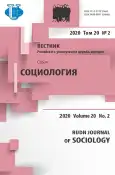Media mythology of the social in the contemporary society
- Authors: Plotichkina N.V.1
-
Affiliations:
- Kuban State University
- Issue: Vol 20, No 2 (2020)
- Pages: 239-251
- Section: Theory, Methodology and History of Sociological Research
- URL: https://journal-vniispk.ru/2313-2272/article/view/322796
- DOI: https://doi.org/10.22363/2313-2272-2020-20-2-239-251
- ID: 322796
Cite item
Full Text
Abstract
The article considers the media mythologization of the social: the media create representations of the world as a place for power struggle and suggest various versions of sociality which are legitimized in mythical narratives. Academic arguments emphasize the complexity of the social, the necessity of its theorization and dereification in the digital context. The study of the social/media dialectic reveals three myths - of natural collectivity, of the mediated center and of big data. The myth of the mediated center is a double construct: a narrative about the center of knowledge, values and meanings in society which produces normative or descriptive truth; and a mythical narrative of the media as representing society to its members and having a privileged access to the center of the social reality. This myth legitimizes the symbolic power of the mass media and is supported by rituals. The myth of ‘us’ aims at ‘naturalizing’ the network sociality, convincing users of the naturalness of its contacts, interactions and communities, providing the sense of cohesion and constructing a digital identity. The myth of ‘us’ is a narrative about collectivity determined by the joint efforts of users and designers of social platforms. This myth hides the decay of the social in the digital reality and indicates its media-mythical compensation. Big data represent new landscapes of objects, methods of cognition and definition of sociality. Big data is not only a source of knowledge, innovation and change but also a mythology which should be critically examined. The article considers different approaches to the analysis of big data mythology developed within the interpretation of digital artifacts as a reflection of the social context and the best form of social knowledge. This myth presents its version of sociology - with new epistemology, ethics and methodology - and hides other sources of knowledge about sociality in the digital media (mythologizes data policy (agency), economies, ethics and epistemologies).
About the authors
N. V. Plotichkina
Kuban State University
Author for correspondence.
Email: oochronos@mail.ru
кандидат политических наук, доцент кафедры государственной политики и государственного управления
Stavropolskaya St., 149, Krasnodar, 350040, RussiaReferences
- Lovink G. Kriticheskaja teorija interneta [Critical Internet Theory]. Moscow; 2019 (In Russ.).
- Alaimo C., Kallinikos J. Computing the everyday: Social media as data platforms. Information Society. 2017; 33 (4).
- Boellstorff T. Making big data, in theory. First Monday. 2013; 18 (10).
- Boyd D., Crawford K. Critical questions for big data: Provocations for a cultural, technological, and scholarly phenomenon. Information, Communication & Society. 2012; 15 (5).
- Clough P., Gregory K., Haber B., Scannell R.J. The Datalogical Turn. Non-Representational Methodologies: Re-Envisioning Research. London–New York; 2015.
- Couldry N. A necessary disenchantment: Myth, agency and injustice in a digital world. Sociological Review. 2014; 62 (4).
- Couldry N. Illusions of immediacy: Rediscovering Hall’s early work on media. Media, Culture and Society. 2015; 37 (4).
- Couldry N. Media Rituals: A Critical Approach. London; 2003.
- Couldry N. The myth of “us”: Digital networks, political change and the production of collectivity. Information, Communication & Society. 2015; 18 (6).
- Couldry N. The Myth of Big Data. The Datafied Society. Studying Culture through Data. Amsterdam; 2017.
- Couldry N., Mejias U. Data colonialism: Rethinking big data’s relation to the contemporary subject. Television & New Media. 2019; 20 (4).
- Couldry N., van Dijck J. Researching social media as if the social mattered. Social Media + Society. 2015; 1 (2).
- Couldry N., Yu J. Deconstructing datafication’s brave new world. New Media & Society. 2018; 20 (12).
- Crawford K. The hidden biases in big data. http://blogs.hbr.org/2013/04/the-hidden-biases-in-big-data.
- Crawford K., Miltner K.M., Gray M.L. Critiquing big data: Politics, ethics, epistemology. International Journal of Communication. 2014; 8.
- Hall S. Culture, the media and the “ideological effect”. Mass Communication and Society. London; 1977.
- Kitchin R. Big data, new epistemologies and paradigm shifts. Big Data & Society. 2014; 1 (1).
- Knorr-Cetina K. Post-social relations: Theorizing sociality in a post-social environment. Handbook of Social Theory. Londonl; 2001.
- Markham A.N. Ethnography in the digital era: From fields to flow, descriptions to interventions. Sage Handbook of Qualitative Research. Thousand Oaks; 2017.
- Marres N., Gerlitz C. Social Media as Experiments in Sociality. Inventing the Social. Manchester; 2018.
- Ossewaarde M. Digital transformation and the renewal of social theory: Unpacking the new fraudulent myths and misplaced metaphors. Technological Forecasting and Social Change. 2019; 146.
- Sewell W. Logics of History: Social Theory and Social Transformation. Chicago; 2005.
- Thatcher J., O’Sullivan D., Mahmoudi D. Data colonialism through accumulation by dispossession: New metaphors for daily data. Environment and Planning D: Society and Space. 2016; 34 (6).
- Treem J.W., Dailey S.L., Pierce C.S., Biffl D. What we are talking about when we talk about social media: A framework for study. Sociology Compass. 2016; 10 (9).
- Van Dijck J. Datafication, dataism and dataveillance: Big data between scientific paradigm and ideology. Surveillance & Society. 2014; 12 (2).
Supplementary files









